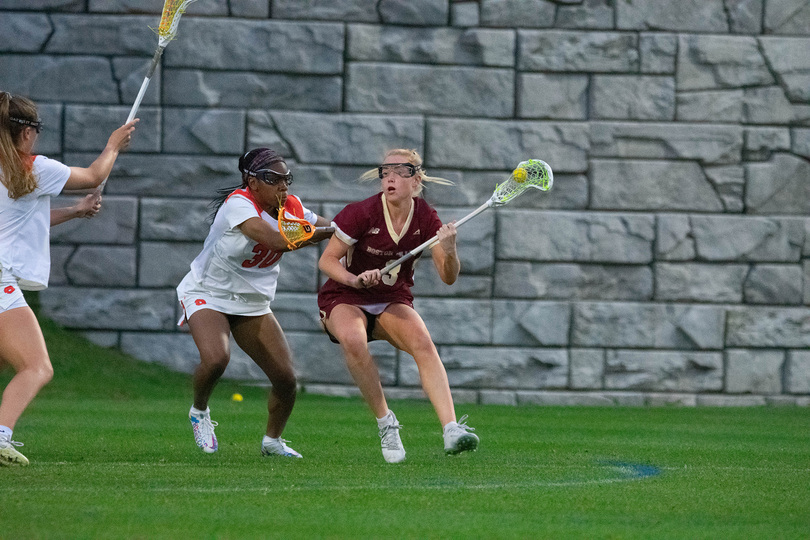Road to victory: where SU needs to improve to win the ACC, NCAA Championships

Jacob Halsema | Staff Photographer
Syracuse has yet to replicate its defensive success after Bianca Chevarie went down with a season-ending injury against Stony Brook.
Get the latest Syracuse news delivered right to your inbox. Subscribe to our sports newsletter here.
Syracuse (15-1, 8-1 Atlantic Coast) ended its best regular season in program history with its worst single-game adjusted defensive efficiency of the year (30.6%).
In the team’s first loss to Boston College, both Sierra Cockerille and head coach Kayla Treanor said BC was beating Syracuse with “the same thing.” Each possession, the Eagles passed to X, then tried to hit cutters in stride near the crease. If they couldn’t, the ball swung back to the top as players looked for other cut lanes.
With one minute left in the third, Courtney Weeks and Belle Smith started the rally that ended SU’s undefeated season. After Weeks collected at X, Smith charged from the left, reached above her head to catch a pass, then scored under pressure to cut the Syracuse lead to four. In the final quarter, the two combined for six points as BC outscored the Orange 7-2 to mount a 17-16 upset.
“It felt like we were playing catch-up even though we were in the lead,” Treanor said postgame.
Defensively, Syracuse must eliminate the possibility of repeating its collapse against BC. While Syracuse’s 19% season-long adjusted defensive efficiency ranks third in the country, the Eagles exposed the chink in SU’s armor. Now, every team knows how to hurt Syracuse: motion to the middle of the eight. Offensively, SU just needs to keep its identity. Syracuse leads Division I in shot percentage, on goal shot percentage, adjusted offensive efficiency and assists per game, also ranking second in points per game.
Entering tournament play, opponents will surely try to replicate Boston College’s success, so the Orange must find a quick fix for the sliding issues they brought on.
After the loss, Treanor said the team’s first priority was to sit down and study film, dissecting what went wrong defensively, especially in the fourth quarter. But the Syracuse defense has been a tale of two teams all season.
The first eight games that calculated adjusted defensive efficiency were all under 24%. But, in the last five games, Syracuse produced above 20% in three games.

Courtesy of LacrosseReference
When Bianca Chevarie went down with a season-ending injury against Stony Brook on March 22, the unit’s efficiency deteriorated severely over the next two weeks. It’s evened out since then, but Syracuse has yet to replicate its success from before Chevarie’s injury.
If Syracuse advances through the ACC Tournament, which features five top-12 teams, it will play some of the nation’s top squads back-to-back. The SU defense will need to replace Chevarie’s impact around the crease to stand a chance against tougher-than-average opponents.
Other than the regular-season opener and finale, Syracuse won every game by multiple goals, including eight wins over ranked teams and five by double-digit scores. While the defensive collapse against BC showed that Syracuse can still improve entering the postseason, its offense just needs to stay consistent.
“Sticking with what we’ve done all season will be crucial to our success in the postseason,” Meaghan Tyrrell said.
Syracuse has produced a 74.6% adjusted on goal shot percentage this season, which is 4.4% higher than the next-best team, Boston College. That’s the biggest gap between any two teams in the top 100 for that category. The Orange also lead the nation in adjusted shot percentage by 4.4%, the largest margin in the entire stat category.

Jacques Megnizin | Design Editor
Syracuse is leaps and bounds ahead of most of its offensive competition because when it shoots, it scores. It’s just that simple. This team can get to the cage and score from inside better than anyone. Even in the loss to BC, it still produced 16 goals from eight different players.
Syracuse has reached double-digit goal scorers on multiple occasions this year, and still have two players that rank top 10 in points per game: Meaghan and Emma Ward.
Emily Hawryschuk, who graduated last spring as SU’s all-time goals leader, said the biggest difference from last year’s squad is the depth of this healthy attack. Last season, Emma Tyrrell, Cockerille and Ward were out for the season, while Megan Carney was hurt down the stretch. Those four players are all top-six scorers on this year’s squad.
SU now boasts seven high-level attackers, Hawryschuk explained. Meaghan, Emma, Carney, Ward, Cockerille, Maddy Baxter and Olivia Adamson are all capable of creating scoring opportunities on their own. Entering the postseason relatively injury-free, opponents won’t be able to clamp down on just one or two attackers like they did last season.
Despite playing in all but five NCAA Tournaments since 2000, Syracuse has never won it. It has been runner-up three times in the past 11 years, including 2021 when it lost to (you guessed it) Boston College in the national championship. But this year, SU is in prime position to win the elusive title. And Hawryschuk, now an assistant at Niagara, is confident they can make a championship run.
“What happened in that loss to BC, I don’t think they will let that happen again,” Hawryschuk said.
On Wednesday, No. 2 seed Syracuse begins the ACC Tournament in Charlotte, North Carolina against seventh-seeded Virginia Tech. A win would earn a semifinal berth against UNC or Clemson two days later. The championship game would take place on Sunday the 30th, two days after the semis.
It’s more than likely that Syracuse, if it advances to the ACC Championship game, would face Boston College again. That game would be monumental for SU’s momentum entering the NCAA Tournament.
If Syracuse can prove it’s grown defensively since the regular-season finale, teams will take note. If it can’t, opponents will take aim.





